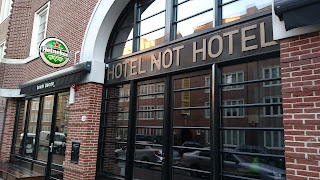Thomas's Pandemic Diaries: The Good Ole' Literature Review for the Dissertation
Green and leafy London is affording me a nice atmosphere in which to tackle phase one of my UK Master's dissertation. Its working title is "Gift of the Gab: The Rise of the Audiobook and the Festive Turn in Library Science." The scholars I am reading are quite masterful and eloquent and I wonder if I can elevate my chatty banter in time for final publication. Ironically, what draws me to the subject of the audiobook (and to the podcast) is the approachability and egalitarianism of the medium and subsequently, the literature depicting it. Of course, the one community who would be left out is the deaf community; still I do believe the "A-book" reaches quite a large slice of the population who never "caught on" to SSR (Sustained Silent Reading). We've all have had a bad experience or two in high school English class.
So a bit of housecleaning around terminology. A Master's thesis in the U.S. is for an M.A. or M.S. while a dissertation is for a PhD. Here in the UK, it is switched. So do not assume I am more advanced than I am. "When in London, speak as the Londoners do."
After thinking about a topic of research that excites you and discussing it with one's advisor, the working phase one of most dissertation is what we postgraduates call "The Literary Review," basically collecting and collating all that is reputable and relevant to a subject, reading all you can from this collection and taking appropriate notes. One helpful maneuver is to arrange/limit one's own search criteria for the sake of time and relevance. For instance, for the bulk of 80% of my material, I have confined my sources to those academic articles printed in English that are not more than twenty years old (ideally not more than 10 years old!!). Exceptions I have been made for the prominent media and communication theorists of the mid-20th century hailing from "The Toronto School" which is short-hand for "The Toronto School of Communication Theory," a vibrant group and era from the University of Toronto in the 1960s. These include Marshall McLuhan and his protege Walter Ong. Other information behaviourists I am absorbing are the likes of Marcia Bates (famous for the browsing idea of "berry-picking"), Brenda Dervin (famous for "Sense Making"), and Karen Fisher (famous for "Information Grounds"). The latter three American professors have innovative information behaviours that I find close to the audiobook's sense of festivity and egalitarianism.
The next bucket of researchers in my work shed include current writers and thinkers out of Denmark and London and Cambridge, Massachusetts. The Danish duo, Iben Have and Birgitte Stougaard Pedersen, have written prolifically about sound technology and the audiobook having its moment in educational culture and are doing exceptional work in Aarhus University. Indispensable for his intelligent and approachable style is Matthew Rubery, whose 2016 tome, "The Untold Story of the Talking Book," has been an absolute gem and oasis of knowledge.
The last tier of who and what I'm reading are the trade journal publication articles of librarians themselves. I believe there should always be a vein of practicality in any academic work. My queries include: How much respect do current librarians give the audiobook (personally and vocationally)? Do librarians consider it a worthy rival for the printed book or even the E-book? Are libraries keeping abreast with the surge in demand of A-books, especially during this pandemic and accompanying lockdown? If so, how?
---
The Literature Review is basically the phase in which to devote yourself to devouring the words and works of the leading lights and any other researchers of a certain subject. In my case, it is studying the research regarding sound technology and its effect on library patronage and information gathering. One's first aim as a researcher is to shoot for "generativity," or an ability to contribute something original or noteworthy back into the field and stand tall with one's peers (Terrell, 2016).
I'm finding with some struggle that a lot of academia is academics "talking" to academics. I would love to be a bridge or at least a "transmitter" between the academic realm and the practical realm. Which is precisely why I enjoy the audiobook and podcast so much - it's not quite straight news or narrative and it's not quite entertainment. But its in-betweenness makes it perfect for this moment of high anxiety and screen fatigue.
More later!
-------
Bibliography
Terrell, S. (2016) Writing a proposal for your dissertation: Guidelines and examples. New York: Guilford Publishers.
So a bit of housecleaning around terminology. A Master's thesis in the U.S. is for an M.A. or M.S. while a dissertation is for a PhD. Here in the UK, it is switched. So do not assume I am more advanced than I am. "When in London, speak as the Londoners do."
After thinking about a topic of research that excites you and discussing it with one's advisor, the working phase one of most dissertation is what we postgraduates call "The Literary Review," basically collecting and collating all that is reputable and relevant to a subject, reading all you can from this collection and taking appropriate notes. One helpful maneuver is to arrange/limit one's own search criteria for the sake of time and relevance. For instance, for the bulk of 80% of my material, I have confined my sources to those academic articles printed in English that are not more than twenty years old (ideally not more than 10 years old!!). Exceptions I have been made for the prominent media and communication theorists of the mid-20th century hailing from "The Toronto School" which is short-hand for "The Toronto School of Communication Theory," a vibrant group and era from the University of Toronto in the 1960s. These include Marshall McLuhan and his protege Walter Ong. Other information behaviourists I am absorbing are the likes of Marcia Bates (famous for the browsing idea of "berry-picking"), Brenda Dervin (famous for "Sense Making"), and Karen Fisher (famous for "Information Grounds"). The latter three American professors have innovative information behaviours that I find close to the audiobook's sense of festivity and egalitarianism.
The next bucket of researchers in my work shed include current writers and thinkers out of Denmark and London and Cambridge, Massachusetts. The Danish duo, Iben Have and Birgitte Stougaard Pedersen, have written prolifically about sound technology and the audiobook having its moment in educational culture and are doing exceptional work in Aarhus University. Indispensable for his intelligent and approachable style is Matthew Rubery, whose 2016 tome, "The Untold Story of the Talking Book," has been an absolute gem and oasis of knowledge.
The last tier of who and what I'm reading are the trade journal publication articles of librarians themselves. I believe there should always be a vein of practicality in any academic work. My queries include: How much respect do current librarians give the audiobook (personally and vocationally)? Do librarians consider it a worthy rival for the printed book or even the E-book? Are libraries keeping abreast with the surge in demand of A-books, especially during this pandemic and accompanying lockdown? If so, how?
---
The Literature Review is basically the phase in which to devote yourself to devouring the words and works of the leading lights and any other researchers of a certain subject. In my case, it is studying the research regarding sound technology and its effect on library patronage and information gathering. One's first aim as a researcher is to shoot for "generativity," or an ability to contribute something original or noteworthy back into the field and stand tall with one's peers (Terrell, 2016).
I'm finding with some struggle that a lot of academia is academics "talking" to academics. I would love to be a bridge or at least a "transmitter" between the academic realm and the practical realm. Which is precisely why I enjoy the audiobook and podcast so much - it's not quite straight news or narrative and it's not quite entertainment. But its in-betweenness makes it perfect for this moment of high anxiety and screen fatigue.
More later!
-------
Bibliography
Terrell, S. (2016) Writing a proposal for your dissertation: Guidelines and examples. New York: Guilford Publishers.







Comments
Post a Comment